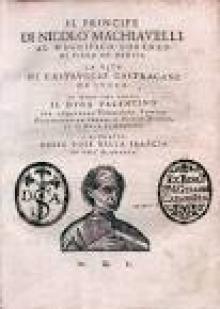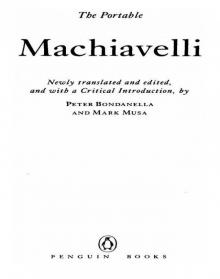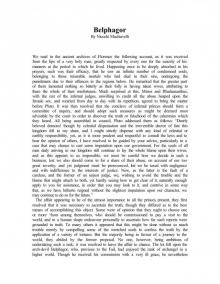- Home
- Niccolo Machiavelli
History of Florence and of the Affairs of Italy Page 13
History of Florence and of the Affairs of Italy Read online
Page 13
Pisa, but the Florentines, by a treaty with Pistoia, withdrew her from
obedience to him. Castruccio then besieged Pistoia, and persevered
with so much vigor and resolution, that although the Florentines often
attempted to relieve her, by attacking first his army and then his
country, they were unable either by force or policy to remove him; so
anxious was he to punish the Pistolesi and subdue the Florentines. At
length the people of Pistoia were compelled to receive him for their
sovereign; but this event, although greatly to his glory, proved but
little to his advantage, for upon his return to Lucca he died. And as
one event either of good or evil seldom comes alone, at Naples also
died Charles duke of Calabria and lord of Florence, so that in a short
time, beyond the expectation of their most sanguine hopes, the
Florentines found themselves delivered from the domination of the one
and the fear of the other. Being again free, they set about the
reformation of the city, annulled all the old councils, and created
two new ones, the one composed of 300 citizens from the class of the
people, the other of 250 from the nobility and the people.
The first was called the Council of the People, the other the Council
of the Commune.
CHAPTER VII
The Emperor at Rome--The Florentines refuse to purchase Lucca, and
repent of it--Enterprises of the Florentines--Conspiracy of the
Bardi and the Frescobaldi--The conspiracy discovered and checked--
Maffeo da Marradi appeases the tumult--Lucca is purchased by the
Florentines and taken by the Pisans--The duke of Athens at
Florence--The nobility determine to make him prince of the city.
The emperor, being arrived at Rome, created an anti-pope, did many
things in opposition to the church, and attempted many others, but
without effect, so that at last he retired with disgrace, and went to
Pisa, where, either because they were not paid, or from disaffection,
about 800 German horse mutinied, and fortified themselves at
Montechiaro upon the Ceruglio; and when the emperor had left Pisa to
go into Lombardy, they took possession of Lucca and drove out
Francesco Castracani, whom he had left there. Designing to turn their
conquest to account, they offered it to the Florentines for 80,000
florins, which, by the advice of Simone della Tosa, was refused. This
resolution, if they had remained in it, would have been of the
greatest utility to the Florentines; but as they shortly afterward
changed their minds, it became most pernicious; for although at the
time they might have obtained peaceful possession of her for a small
sum and would not, they afterward wished to have her and could not,
even for a much larger amount; which caused many and most hurtful
changes to take place in Florence. Lucca, being refused by the
Florentines, was purchased by Gherardino Spinoli, a Genoese, for
30,000 florins. And as men are often less anxious to take what is in
their power than desirous of that which they cannot attain, as soon as
the purchase of Gherardino became known, and for how small a sum it
had been bought, the people of Florence were seized with an extreme
desire to have it, blaming themselves and those by whose advice they
had been induced to reject the offer made to them. And in order to
obtain by force what they had refused to purchase, they sent troops to
plunder and overrun the country of the Lucchese.
About this time the emperor left Italy. The anti-pope, by means of the
Pisans, became a prisoner in France; and the Florentines from the
death of Castruccio, which occurred in 1328, remained in domestic
peace till 1340, and gave their undivided attention to external
affairs, while many wars were carried on in Lombardy, occasioned by
the coming of John king of Bohemia, and in Tuscany, on account of
Lucca. During this period Florence was ornamented with many new
buildings, and by the advice of Giotto, the most distinguished painter
of his time, they built the tower of Santa Reparata. Besides this, the
waters of the Arno having, in 1333, risen twelve feet above their
ordinary level, destroyed some of the bridges and many buildings, all
which were restored with great care and expense.
In the year 1340, new sources of disagreement arose. The great had two
ways of increasing or preserving their power; the one, so to restrain
the emborsation of magistrates, that the lot always fell upon
themselves or their friends; the other, that having the election of
the rectors, they were always favorable to their party. This second
mode they considered of so great importance, that the ordinary rectors
not being sufficient for them, they on some occasions elected a third,
and at this time they had made an extraordinary appointment, under the
title of captain of the guard, of Jacopo Gabrielli of Agobbio, and
endowed him with unlimited authority over the citizens. This man,
under the sanction of those who governed, committed constant outrages;
and among those whom he injured were Piero de' Bardi and Bardo
Frescobaldi. These being of the nobility, and naturally proud, could
not endure that a stranger, supported by a few powerful men, should
without cause injure them with impunity, and consequently entered into
a conspiracy against him and those by whom he was supported. They were
joined by many noble families, and some of the people, who were
offended with the tyranny of those in power. Their plan was, that each
should bring into his house a number of armed men, and on the morning
after the day of All Saints, when almost all would be in the temples
praying for their dead, they should take arms, kill the Capitano and
those who were at the head of affairs, and then, with a new Signory
and new ordinances, reform the government.
But, as the more a dangerous business is considered, the less
willingly it is undertaken, it commonly happens, when there is any
time allowed between the determining upon a perilous enterprise and
its execution, that the conspiracy by one means or another becomes
known. Andrea de' Bardi was one of the conspirators, and upon
reconsideration of the matter, the fear of the punishment operated
more powerfully upon him than the desire of revenge, and he disclosed
the affair to Jacopo Alberti, his brother-in-law. Jacopo acquainted
the Priors, and they informed the government. And as the danger was
near, All Saints' day being just at hand, many citizens met together
in the palace; and thinking their peril increased by delay, they
insisted that the Signory should order the alarm to be rung, and
called the people together in arms. Taldo Valori was at this time
Gonfalonier, and Francesco Salviati one of the Signory, who, being
relatives of the Bardi, were unwilling to summon the people with the
bell, alleging as a reason that it is by no means well to assemble
them in arms upon every slight occasion, for power put into the hands
of an unrestrained multitude was never beneficial; that it is an easy
matter to excite them to violence, but a difficult thing to restrai
n
them; and that, therefore, it would be taking a more prudent course if
they were to inquire into the truth of the affair, and punish the
delinquents by the civil authority, than to attempt, upon a simple
information, to correct it by such a tumultuous means, and thus hazard
the safety of the city. None would listen to these remarks; the
Signory were assailed with insolent behavior and indecent expressions,
and compelled to sound the alarm, upon which the people presently
assembled in arms. On the other hand, the Bardi and the Frescobaldi,
finding themselves discovered, that they might conquer with glory or
die without shame, armed themselves, in the hope that they would be
able to defend that part of the city beyond the river, where their
houses were situated; and they fortified the bridge in expectation of
assistance, which they expected from the nobles and their friends in
the country. Their design was frustrated by the people who, in common
with themselves, occupied this part of the city; for these took arms
in favor of the Signory, so that, seeing themselves thus
circumstanced, they abandoned the bridges, and betook themselves to
the street in which the Bardi resided, as being a stronger situation
than any other; and this they defended with great bravery.
Jacopo d'Agobbio, knowing the whole conspiracy was directed against
himself, in fear of death, terrified and vanquished, kept himself
surrounded with forces near the palace of the Signory; but the other
rectors, who were much less blamable, discovered greater courage, and
especially the podesta or provost, whose name was Maffeo da Marradi.
He presented himself among the combatants without any fear, and
passing the bridge of the Rubaconte amid the swords of the Bardi, made
a sign that he wished to speak to them. Upon this, their reverence for
the man, his noble demeanor, and the excellent qualities he was known
to possess, caused an immediate cessation of the combat, and induced
them to listen to him patiently. He very gravely, but without the use
of any bitter or aggravating expressions, blamed their conspiracy,
showed the danger they would incur if they still contended against the
popular feeling, gave them reason to hope their complaints would be
heard and mercifully considered, and promised that he himself would
use his endeavors in their behalf. He then returned to the Signory,
and implored them to spare the blood of the citizens, showing the
impropriety of judging them unheard, and at length induced them to
consent that the Bardi and the Frescobaldi, with their friends, should
leave the city, and without impediment be allowed to retire to their
castles. Upon their departure the people being again disarmed, the
Signory proceeded against those only of the Bardi and Frescobaldi
families who had taken arms. To lessen their power, they bought of the
Bardi the castle of Mangona and that of Vernia; and enacted a law
which provided that no citizen should be allowed to possess a castle
or fortified place within twenty miles of Florence.
After a few months, Stiatta Frescobaldi was beheaded, and many of his
family banished. Those who governed, not satisfied with having subdued
the Bardi and the Frescobaldi, as is most commonly the case, the more
authority they possessed the worse use they made of it and the more
insolent they became. As they had hitherto had one captain of the
guard who afflicted the city, they now appointed another for the
country, with unlimited authority, to the end that those whom they
suspected might abide neither within nor without. And they excited
them to such excesses against the whole of the nobility, that these
were driven to desperation, and ready to sell both themselves and the
city to obtain revenge. The occasion at length came, and they did not
fail to use it.
The troubles of Tuscany and Lombardy had brought the city of Lucca
under the rule of Mastino della Scala, lord of Verona, who, though
bound by contract to assign her to the Florentines, had refused to do
so; for, being lord of Parma, he thought he should be able to retain
her, and did not trouble himself about his breach of faith. Upon this
the Florentines joined the Venetians, and with their assistance
brought Mastino to the brink of ruin. They did not, however, derive
any benefit from this beyond the slight satisfaction of having
conquered him; for the Venetians, like all who enter into league with
less powerful states than themselves, having acquired Trevigi and
Vicenza, made peace with Mastino without the least regard for the
Florentines. Shortly after this, the Visconti, lords of Milan, having
taken Parma from Mastino, he found himself unable to retain Lucca, and
therefore determined to sell it. The competitors for the purchase were
the Florentines and the Pisans; and in the course of the treaty the
Pisans, finding that the Florentines, being the richer people, were
about to obtain it, had recourse to arms, and, with the assistance of
the Visconti, marched against Lucca. The Florentines did not, on that
account, withdraw from the purchase, but having agreed upon the terms
with Mastino, paid part of the money, gave security for the remainder,
and sent Naddo Rucellai, Giovanni di Bernadino de' Medici, and Rosso
di Ricciardo de' Ricci, to take possession, who entered Lucca by
force, and Mastino's people delivered the city to them. Nevertheless,
the Pisans continued the siege, and the Florentines used their utmost
endeavors to relieve her; but after a long war, loss of money, and
accumulation of disgrace, they were compelled to retire, and the
Pisans became lords of Lucca.
The loss of this city, as in like cases commonly happens, exasperated
the people of Florence against the members of the government; at every
street corner and public place they were openly censured, and the
entire misfortune was laid to the charge of their greediness and
mismanagement. At the beginning of the war, twenty citizens had been
appointed to undertake the direction of it, who appointed Malatesta da
Rimini to the command of the forces. He having exhibited little zeal
and less prudence, they requested assistance from Robert king of
Naples, and he sent them Walter duke of Athens, who, as Providence
would have it, to bring about the approaching evils, arrived at
Florence just at the moment when the undertaking against Lucca had
entirely failed. Upon this the Twenty, seeing the anger of the people,
thought to inspire them with fresh hopes by the appointment of a new
leader, and thus remove, or at least abate, the causes of calumny
against themselves. As there was much to be feared, and that the duke
of Athens might have greater authority to defend them, they first
chose him for their coadjutor, and then appointed him to the command
of the army. The nobility, who were discontented from the causes above
mentioned, having many of them been acquainted with Walter, when upon
a former occasion he had governed Florence for the duke of Calabria,
thought they had now a
n opportunity, though with the ruin of the city,
of subduing their enemies; for there was no means of prevailing
against those who had oppressed them but of submitting to the
authority of a prince who, being acquainted with the worth of one
party and the insolence of the other, would restrain the latter and
reward the former. To this they added a hope of the benefits they
might derive from him when he had acquired the principality by their
means. They, therefore, took several occasions of being with him
secretly, and entreated he would take the command wholly upon himself,
offering him the utmost assistance in their power. To their influence
and entreaty were also added those of some families of the people;
these were the Peruzzi, Acciajuoli, Antellesi, and Buonaccorsi, who,
being overwhelmed with debts, and without means of their own, wished
for those of others to liquidate them, and, by the slavery of their
country, to deliver themselves from their servitude to their
creditors. These demonstrations excited the ambitious mind of the duke
to greater desire of dominion, and in order to gain himself the
reputation of strict equity and justice, and thus increase his favor
with the plebeians, he prosecuted those who had conducted the war
against Lucca, condemned many to pay fines, others to exile, and put
to death Giovanni de' Medici, Naddo Rucellai, and Guglielmo Altoviti.
CHAPTER VIII
The Duke of Athens requires to be made prince of Florence--The
Signory address the duke upon the subject--The plebeians proclaim
him prince of Florence for life--Tyrannical proceedings of the
duke--The city disgusted with him--Conspiracies against the duke--
The duke discovers the conspiracies, and becomes terrified--The
city rises against him--He is besieged in the palace--Measures
adopted by the citizens for reform of the government--The duke is
compelled to withdraw from the city--Miserable deaths of Guglielmo
da Scesi and his son--Departure of the duke of Athens--His
character.
These executions greatly terrified the middle class of citizens, but
gave satisfaction to the great and to the plebeians;--to the latter,
because it is their nature to delight in evil; and to the former, by
thus seeing themselves avenged of the many wrongs they had suffered
from the people. When the duke passed along the streets he was hailed
with loud cheers, the boldness of his proceedings was praised, and
both parties joined in open entreaties that he would search out the
faults of the citizens, and punish them.
The office of the Twenty began to fall into disuse, while the power of
the duke became great, and the influence of fear excessive; so that
everyone, in order to appear friendly to him, caused his arms to be
painted over their houses, and the name alone was all he needed to be
absolutely prince. Thinking himself upon such a footing that he might
safely attempt anything, he gave the Signory to understand that he
judged it necessary for the good of the city, that the sovereignty
should be freely given to him, and that as the rest of the citizens
were willing that it should be so, he desired they would also consent.
The Signory, notwithstanding many had foreseen the ruin of their
country, were much disturbed at this demand; and although they were
aware of the dangerous position in which they stood, that they might
not be wanting in their duty, resolutely refused to comply. The duke
had, in order to assume a greater appearance of religion and humanity,
chosen for his residence the convent of the Minor Canons of St. Croce,
and in order to carry his evil designs into effect, proclaimed that
all the people should, on the following morning, present themselves
before him in the piazza of the convent. This command alarmed the
Signory much more than his discourse to them had done, and they
consulted with those citizens whom they thought most attached to their

 The Prince
The Prince Valentino
Valentino The Portable Machiavelli
The Portable Machiavelli History of Florence and of the Affairs of Italy
History of Florence and of the Affairs of Italy Belphagor
Belphagor